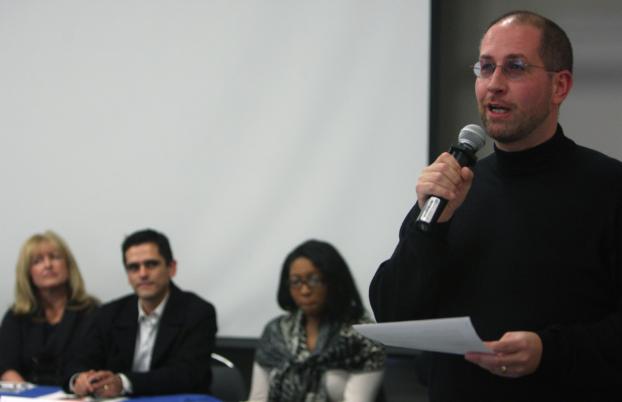 Caption: Jochen Burgtorf, professor of history, right, speaks at this year's Graduate Forum. Photo by Karen Tapia
Caption: Jochen Burgtorf, professor of history, right, speaks at this year's Graduate Forum. Photo by Karen Tapia
What is a Mentor?
New Program Prepares Faculty Members to Mentor Students
THE EXPERIENCE of graduate school can be an “odyssey,” a long journey with many detours, which hopefully, eventually, leads to the desired outcome: the degree.
Research has long recognized the importance of mentoring in the careers of graduate students, and it is fitting that the word “mentor” first appears on the scene in Homer’s ancient Greek epic poem, “The Odyssey,” not as a descriptive noun, but as the personal name of Mentor, the trusted friend of Ulysses or Odysseus, entrusted with Ulysses’ son Telemachus.
Few academic mentors would define themselves as trusted friends, even though, in my opinion, both trust and friendship are key components in mentoring.
So, what is a mentor?
According to the University of Michigan’s Handbook for Faculty Mentors, mentors are people who:
- ”take an interest in developing another person’s career and well-being;
- have an interpersonal as well as a professional relationship with those whom they mentor;
- advance the person’s academic and professional goals in directions most desired by the individual; and
- tailor mentoring styles and content to the individual, including adjustments due to differences in culture, ethnicity, gender and so on.”
“Some faculty members limit the responsibilities of mentoring to simply discharging their role as adviser. While assigned advisers can certainly be mentors, and often are, effective mentoring requires playing a more expansive role in the development of a future colleague,” the handbook says. “The role of adviser usually is limited to guiding academic progress. The role of mentor is centered on a commitment to advancing the student’s career through an interpersonal engagement that facilitates sharing guidance, experience and expertise.”
There are several aspects of this definition that are striking. My favorite one is to view the graduate mentee as a future colleague, because it emphasizes that mentoring has a bidirectional benefit.
This semester, as part of EPOCHS (the university’s $2.8 million Promoting Postbaccalaureate Opportunities for Hispanic Americans grant from the U.S.Department of Education), Cal State Fullerton launched a Faculty-Student Mentoring Program. Out of 70 faculty applicants to the program, 25 from all eight colleges of the university, were selected to form the first cohort, or “think tank” as I like to call it, to spearhead these efforts on campus.
The 25 faculty mentors participate in a number of workshops, will generate a training curriculum for mentors, and interact with graduate students in the process, formally and informally.
The ultimate goal of this initiative is the development of a clear infrastructure for graduate mentoring at CSUF, to ensure the success of all our students, especially those identified as disadvantaged by the EPOCHS grant.
In conjunction with the Faculty Development Center, for example, the mentoring program plans to design and sponsor an ongoing series of workshops that, if taken in conjunction, would lead to a Mentoring Certificate, similar to the Teaching and Learning Academy Certificate.
The “think tank,” so far, has worked to identify five areas where training is needed.
- Mentoring Relationships
Faculty/student mentoring models (pairs, triads, etc.); peer mentoring; cross-disciplinary mentoring; mentoring contracts; online mentoring; mentoring space (brick and mortar); long-term mentoring; mutual benefit of mentoring; -
Mentoring and Diversity
Cultural sensitivity (race-ethnicity, class, gender-sexuality, etc.); formal and informal on-campus and off-campus activities for mentees and mentors (and third parties); focus groups; balancing family-school-work; -
Mentoring and the Funding of Graduate Education
Providing guidance in graduate student budget planning; publicizing scholarships, grants, awards, research support, travel support, internal and external resources; encouraging and assisting students applying for financial resources; -
Mentoring and Training Graduate Students
Workshops for mentees (but involving mentors) on writing skills, research strategies, theories and methodologies, critical thinking, communication and presentation skills, graduate program requirements and graduation regulations); resources for mentors; - Mentoring and Marketing
Recruiting undergraduates into graduate programs; connecting graduate students beyond the campus (networking with alumni and professional organizations); pro-active career support and job-search assistance.
We have only been at work for about five weeks, but things are coming together, and I for one, am learning a lot. For example, at our last workshop, Andrea Guillaume, professor of elementary and bilingual education, enlightened us about the phases of a mentoring relationship: initiation, cultivation, separation, and re-definition.
I had never considered “separation” and “re-definition,” but it is a really good challenge to keep in mind that mentoring continues beyond the degree.
Mentor, the friend of Ulysses, did not die, when Ulysses came home.
Jochen Burgtorf is a history professor and coordinator of Cal State Fullerton’s EPOCHS Faculty/Student Mentoring Program.
April 6, 2011
